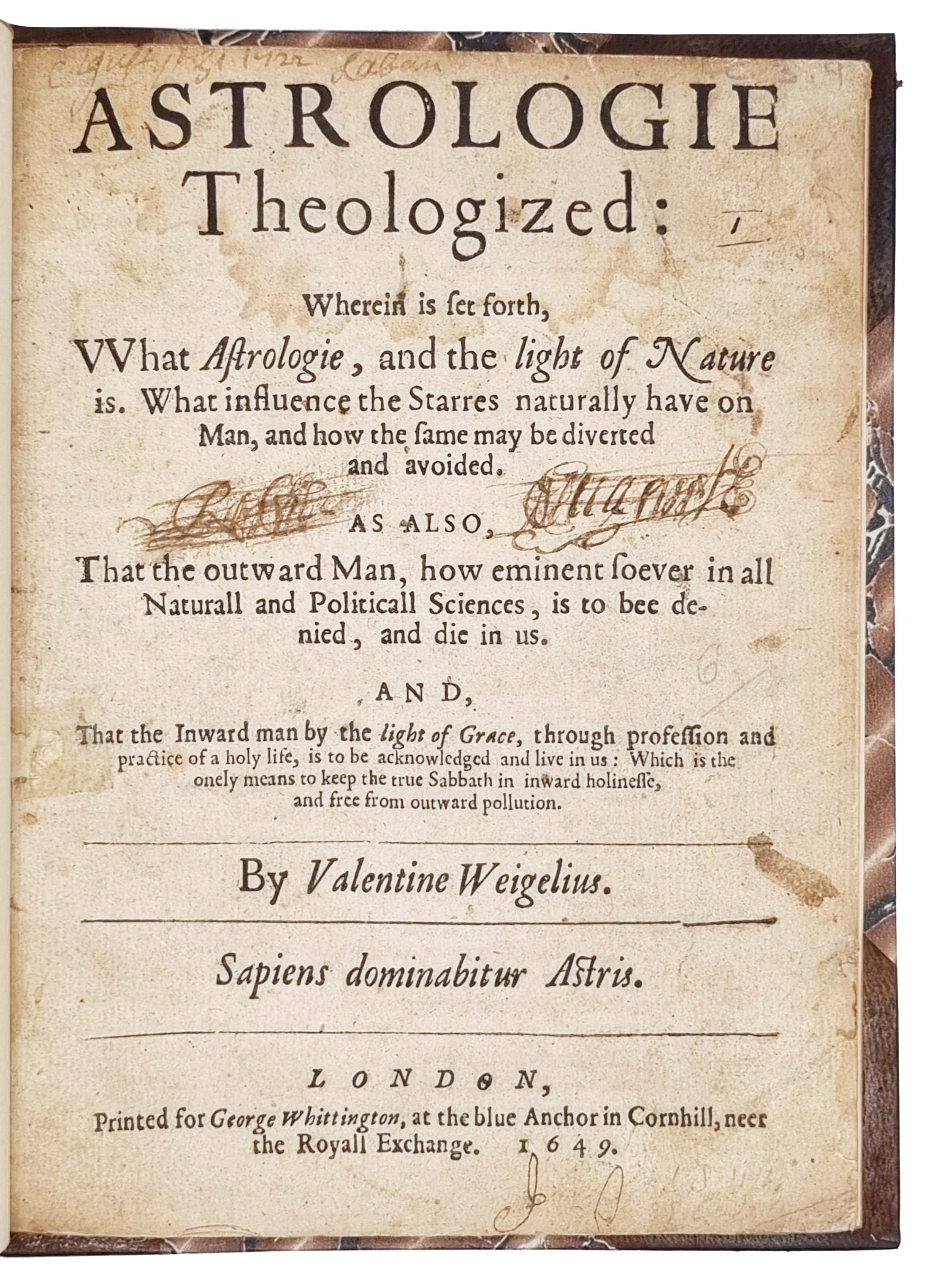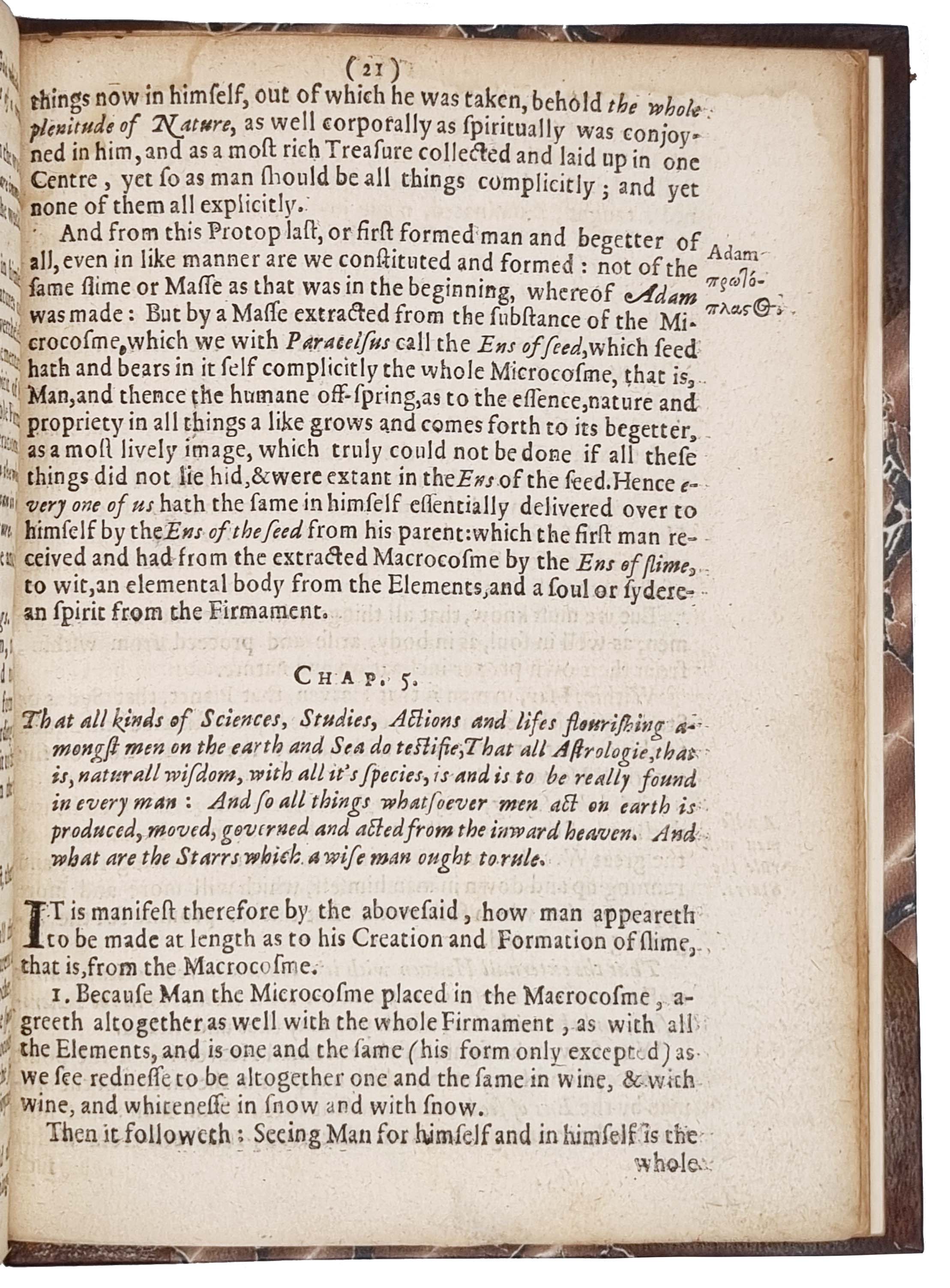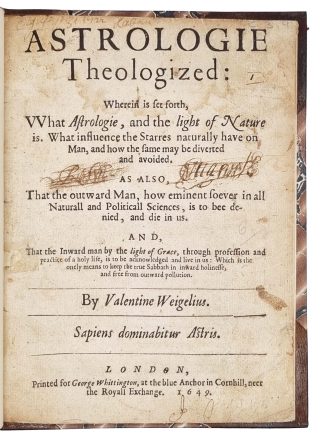WEIGEL, Valentine
Astrologie theologized: wherein is set forth, vvhat astrologie, and the light of nature is. What influence the starres naturally have on man, and how the same may be diverted and avoided.
London, printed for George Whittington, 1649£2,750.00
FIRST EDITION thus. 4to. pp. [ii], 46.Signatures: A-F⁴. Roman letter, some Italic. Woodcut headpiece and initial, contemporary autograph scribbled over on title, purchase note ‘August 1722 Laban” at head, “Ex libris B. K. T. Pagel” inked to label on pastedown. Light browning, title and first few leaves dusty with light waterstain at head, early repair to small hole in inner blank margin of title, the odd marginal spot or mark. A good copy in three quarter calf over marbled boards circa 1900.
Rare first edition of this translation into English of this important spiritual work that was to have tremendous influence in England in Theosophist circles in the C19th, especially after it was reprinted with a commentary by Anna Kingsford in 1886. Valentin Weigel (1553-1588) was a mystical writer who drew upon Paracelsist and alchemical ideas. His ideas influenced Jacob Boehme, and other German Protestant mystics of the 17th century. Most of his writings were published after his death, when a small group of Weigelians promoted his ideas, and some texts were issued in his name, pseudonymously. This is the only one of his works that was published in English. ESTC assigns the work to Valentine Wiegel, with the note “German or Latin original, if any, not traced” It is, however, uncertain whether it was written by Weigel himself. The text was first printed anonymously in 1617 under the title: Astrologia Theologizata,. The following year a German translation was printed under Weigel’s name as the ‘second part’ of the ‘Gnothi Seauton’. There is no manuscript tradition associated with this text before c.1620, long after Weigel’s death in 1588. But whether written by Weigel, or later by one of his school, it is a good illustration of the way in which mystically inclined Christians of that period, inspired by Weigel, endeavoured to make spiritual conquest of the prevailing Astrology.
“The Saxon Lutheran pastor Valentin Weigel (1533–1588) was marked by modern scholars as a mystic, a theosopher, or a Paracelsian. Despite the inspiration he drew from Paracelsus and his natural philosophy, nevertheless, his interests in nature were rather limited. He was no physician, no astronomer and no alchemist .. alchemical themes appear only marginally in his works. Obviously, he is interested in theological topics for the most part. However, his followers allegedly built him a tombstone with alchemical symbols, and some alchemical works were later published under his name. By the end of the 17th century, he is mentioned as one of the figures in the uninterrupted chain of German adepts who reaped the ‘golden harvest’, .. Such a reputation could be established largely due to pseudonymous texts that together with Weigel’s authentic works began to spread in print editions after 1609, arousing considerable interest, both positive and negative. .. As a heir of the German Mysticism translated in the language of the Reformation, and a disseminator of some concepts of Paracelsus (esp. his concept of ‘two lights’ or man as microcosm), Weigel could create a general philosophical-theological and epistemological framework suitable also for alchemy. Generally, Weigel’s basic concern is man’s relationship to God. He draws on Paracelsus’ (1493–1541) , Ficino’s (1433–1499), and Pico della Mirandola’s (1463–1494) ideas of man as a microcosm containing in himself everything: the earthly (elemental and astral), the heavenly, and also the divine. Therefore, the primary issue is self-knowledge: it enables us to see that we are a unity of these “layers” and to ponder the implications this has for us. Similarly, to know God means to know man and to understand the nature of the world. For some, he was a theosophist and alchemist, aiming not at the transmutation of metals, but at the transformation and rebirth of man. His critics connected his ideas with Rosicrucianism ..” Martin Žemla ‘Valentin Weigel and alchemy’.
Wing W1255. Thomason, E.562[14]. Thorndike VII p. 94. Gardner 1273. Cantamessa 8615.In stock




